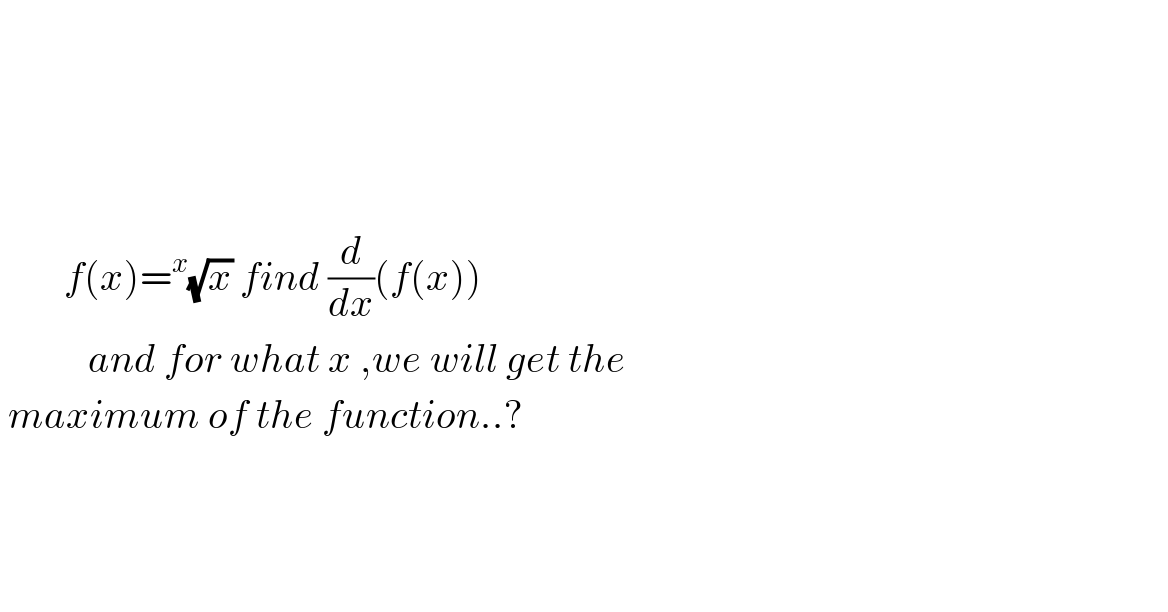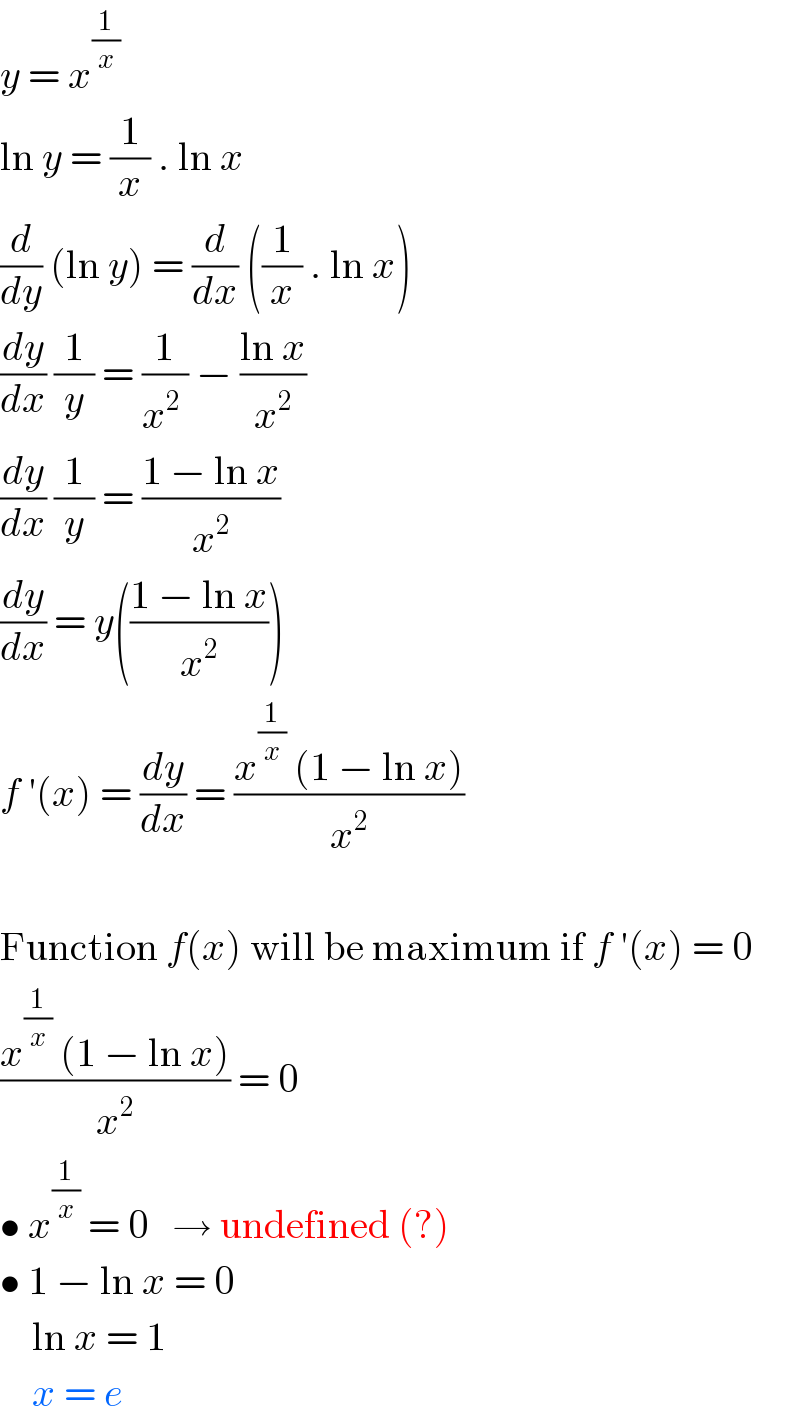
Question Number 11546 by Nayon last updated on 28/Mar/17

$$ \\ $$$$ \\ $$$$ \\ $$$$ \\ $$$$\:\:\:\:\:\:\:\:{f}\left({x}\right)=^{{x}} \sqrt{{x}}\:{find}\:\frac{{d}}{{dx}}\left({f}\left({x}\right)\right)\: \\ $$$$\:\:\:\:\:\:\:\:\:\:\:{and}\:{for}\:{what}\:{x}\:,{we}\:{will}\:{get}\:{the}\: \\ $$$$\:{maximum}\:{of}\:{the}\:{function}..? \\ $$$$ \\ $$$$ \\ $$$$\:\:\:\: \\ $$
Answered by sma3l2996 last updated on 28/Mar/17

$$\frac{{d}\left({f}\left({x}\right)\right)}{{dx}}=\frac{{d}\left(\sqrt[{{x}}]{{x}}\right)}{{dx}}=\frac{{d}\left({e}^{{ln}\left({x}^{\frac{\mathrm{1}}{{x}}} \right)} \right)}{{dx}}=\frac{{d}\left({e}^{\frac{{ln}\left({x}\right)}{{x}}} \right)}{{dx}} \\ $$$$=\frac{{d}\left(\frac{{ln}\left({x}\right)}{{x}}\right)}{{dx}}{e}^{\frac{{ln}\left({x}\right)}{{x}}} =\frac{\mathrm{1}−{ln}\left({x}\right)}{{x}^{\mathrm{2}} }{e}^{{ln}\left(\sqrt[{{x}}]{{x}}\right)} \\ $$$$=\frac{\left(\mathrm{1}−{ln}\left({x}\right)\right)\sqrt[{{x}}]{{x}}}{{x}^{\mathrm{2}} } \\ $$$${when}\:{f}\:{get}\:{the}\:{maximum}\:{so}\:{f}'\left({x}\right)=\mathrm{0} \\ $$$$\frac{\left(\mathrm{1}−{ln}\left({x}\right)\right)\sqrt[{{x}}]{{x}}}{{x}^{\mathrm{2}} }=\mathrm{0}\:\:{and}\:\:\sqrt[{{x}}]{{x}}={e}^{\frac{{ln}\left({x}\right)}{{x}}} >\mathrm{0} \\ $$$$\mathrm{1}−{ln}\left({x}\right)=\mathrm{0}\:\Leftrightarrow{ln}\left({x}\right)=\mathrm{1}\: \\ $$$${x}={e}\: \\ $$
Commented by Nayon last updated on 28/Mar/17

$${thanks}\:{a}\:{lot}\: \\ $$
Answered by Joel576 last updated on 28/Mar/17

$${y}\:=\:{x}^{\frac{\mathrm{1}}{{x}}} \\ $$$$\mathrm{ln}\:{y}\:=\:\frac{\mathrm{1}}{{x}}\:.\:\mathrm{ln}\:{x} \\ $$$$\frac{{d}}{{dy}}\:\left(\mathrm{ln}\:{y}\right)\:=\:\frac{{d}}{{dx}}\:\left(\frac{\mathrm{1}}{{x}}\:.\:\mathrm{ln}\:{x}\right) \\ $$$$\frac{{dy}}{{dx}}\:\frac{\mathrm{1}}{{y}}\:=\:\frac{\mathrm{1}}{{x}^{\mathrm{2}} \:}\:−\:\frac{\mathrm{ln}\:{x}}{{x}^{\mathrm{2}} } \\ $$$$\frac{{dy}}{{dx}}\:\frac{\mathrm{1}}{{y}}\:=\:\frac{\mathrm{1}\:−\:\mathrm{ln}\:{x}}{{x}^{\mathrm{2}} } \\ $$$$\frac{{dy}}{{dx}}\:=\:{y}\left(\frac{\mathrm{1}\:−\:\mathrm{ln}\:{x}}{{x}^{\mathrm{2}} }\right) \\ $$$${f}\:'\left({x}\right)\:=\:\frac{{dy}}{{dx}}\:=\:\frac{{x}^{\frac{\mathrm{1}}{{x}}} \:\left(\mathrm{1}\:−\:\mathrm{ln}\:{x}\right)}{{x}^{\mathrm{2}} } \\ $$$$ \\ $$$$\mathrm{Function}\:{f}\left({x}\right)\:\mathrm{will}\:\mathrm{be}\:\mathrm{maximum}\:\mathrm{if}\:{f}\:'\left({x}\right)\:=\:\mathrm{0} \\ $$$$\frac{{x}^{\frac{\mathrm{1}}{{x}}} \:\left(\mathrm{1}\:−\:\mathrm{ln}\:{x}\right)}{{x}^{\mathrm{2}} }\:=\:\mathrm{0} \\ $$$$\bullet\:{x}^{\frac{\mathrm{1}}{{x}}} \:=\:\mathrm{0}\:\:\:\rightarrow\:\mathrm{undefined}\:\left(?\right) \\ $$$$\bullet\:\mathrm{1}\:−\:\mathrm{ln}\:{x}\:=\:\mathrm{0} \\ $$$$\:\:\:\:\mathrm{ln}\:{x}\:=\:\mathrm{1} \\ $$$$\:\:\:\:{x}\:=\:{e} \\ $$
Commented by Nayon last updated on 28/Mar/17

$${in}\:{the}\:{third}\:{line}\:\frac{{d}}{{dx}}\left({lny}\right)=\frac{{d}}{{dx}}\left(\frac{\mathrm{1}}{{x}}{lnx}\right) \\ $$$${or}\:\frac{{d}}{{dy}}\left({lny}\right)=\frac{{d}}{{dx}}\left(\frac{\mathrm{1}}{{x}}.{lnx}\right)???????? \\ $$
Commented by Joel576 last updated on 28/Mar/17

$$\mathrm{Differential}\:\mathrm{at}\:\mathrm{both}\:\mathrm{section} \\ $$$$\frac{{d}}{{dy}}\:\left(\mathrm{ln}\:{y}\right)\:=\:\frac{{d}}{{dx}}\:\left(\frac{\mathrm{1}}{{x}}\:.\:\mathrm{ln}\:{x}\right) \\ $$
Commented by Nayon last updated on 28/Mar/17

$${wrong}\:{it}'{ll}\:{be}\:\:\frac{{d}}{{dy}}{lny}.\frac{{dy}}{{dx}} \\ $$
